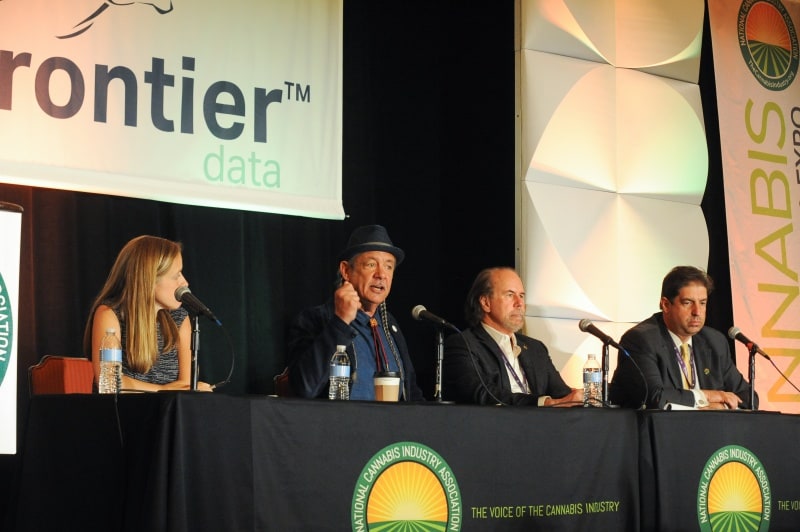
The Cannabis industry’s occupation rainbow was displayed in its full spectrum on June 12-14 at the National Cannabis Industry Association (NCIA), Cannabis Business Summit and Expo. As the organization’s largest meeting yet, 4,500 people gathered at the Oakland Marriott City Center. Medical experts, attorneys, technology and software specialists, and public policy advocates were only a sliver of the array. From seed to sale to recycling soil, and making it legal at every step, the heart of Oakland glimmered with green.
With more than 120 speakers at the event, topics included: Fine Print: Money, Law, and Your Business; Cultivation and Processing; Running Your CannaBusiness; Policy and Reform; and Leading Edge: Emerging Topics in the Cannabis Industry. The conference, which hosted over 250 vendors, had an organized, efficient flow that kept everyone moving and mixing on the expo floors, and between ballrooms, workshops, and the cannabis bookstore.
Vicente Fox, former President of Mexico, challenged the American cannabis industry during his keynote address. Canada has already legalized cannabis on a federal level, and Mexico has followed suit for medical use, with recreational in the works. Both countries are forging ahead with research and development, Fox explained, and the U.S. is not in step with the global community on cannabis.
“It is not the right of governments to intervene in citizens’ personal behavior or beliefs. I don’t think prohibition works,” Fox stated, describing his position on legalization. “It’s time to start thinking wisely. Forget about prohibition and criminalization, [and] start respecting human beings’ freedom. They will make the right choice.”
Located between the South American illegal drug trade and the mammoth-market demand from the U.S. and Canada, Fox described the painfully high price Mexico has paid trying to maintain prohibition. “We have suffered violence, organized crime, homicides, human rights violations, and lack of due process,” he said, “And all of this because of the idea of imposing behaviors.” Fox asserted that the cannabis trade should be a part of the North American Free Trade Agreement (NAFTA), without trade barriers or taxes, noting the capacity to create jobs and stop violence.
Following Fox’s speech, the summit was in full swing with “meet the author” book signings, and a full afternoon of speakers and exhibitions. John Hudak, author of “Marijuana: A Short History,” started the book signing, followed by Uwe Blesching with “The Cannabis Health Index.” Chris Conrad and his book, “The Newbies Guide to Cannabis and the Industry,” were also available. On Wednesday morning, Steve DeAngelo got the series going with “The Cannabis Manifesto.” Jorge Cervantes spent some time with fans and critics, discussing his many cannabis volumes, including “Marijuana Horticulture: The Indoor/Outdoor Medical Grower’s Bible.” Food-lovers flocked to Donna Shields, MS, RDN, and her work in the “Cannabis Kitchen Cookbook.”
 Some highlights on the expo floor ranged from patrol robots to the riches of dirt. Royal Gold’s owner, Chad Waters, spoke with attendees about the benefits of coco soil. Dr. Kerklaan’s new line of high-dose topicals provided relief from outside the body inward, and Mindy’s Artisanal Edibles delivered cannabis right to the sweet (or savory) tooth. CannaGaurd’s surveillance and garden protection robot was fit for all types of terrain, and can be controlled via phone app. Welcome to the future of farming.
Some highlights on the expo floor ranged from patrol robots to the riches of dirt. Royal Gold’s owner, Chad Waters, spoke with attendees about the benefits of coco soil. Dr. Kerklaan’s new line of high-dose topicals provided relief from outside the body inward, and Mindy’s Artisanal Edibles delivered cannabis right to the sweet (or savory) tooth. CannaGaurd’s surveillance and garden protection robot was fit for all types of terrain, and can be controlled via phone app. Welcome to the future of farming.
The global cannabis industry is blooming like an outdoor, full-sun plant. Despite tireless efforts by supporters to federally legalize the medicinal plant, the U.S. is at risk of falling further behind. “If anything, we don’t need a great America, we need a great world,” Fox said, criticizing the current administration. “The cannabis industry has moved from crime to corporations, participating in a free-trade market, regulated by authorities and consumers. It’s a great responsibility for all industry participants — Farmers, processors, distributors, traders, promoters of this newly born industry. It’s sensible. It requires ethical behavior, so that it grows and flourishes.”



Leave a Reply